(Like most of my editorials, this piece contains really specific spoilers for the film being discussed, which in this case happens to be Star Trek Into Darkness. If you haven’t seen the film, you should first check out Go, See, Talk!’s dueling reviews by me and Bill, respectively; you should also avoid reading this piece, because it’s guaranteed to ruin the experience for you.)
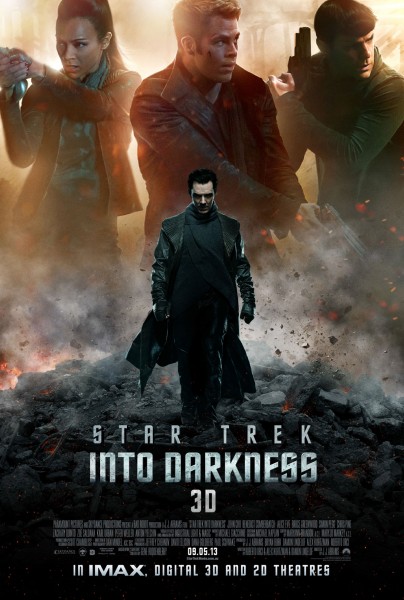 I am by no means a Trekkie. The last time I watched a Star Trek program during its televised run was in 1999, when the series finale for Deep Space Nine ran in June. I haven’t seen a good chunk of the Star Trek movies, but of those that I have seen, I only count a couple of them as being genuinely good. In the utmost example of Trek blasphemes, I prefer Jean-Luc Picard as a captain, but only because I’m most familiar with The Next Generation, a show I grew up on as a 90s kid. I don’t know much about tribbles, and I can’t remember the name of the Vulcan discipline by which control over one’s emotions is maintained. I love science fiction, but for whatever reason, Trek and I just never really connected.
I am by no means a Trekkie. The last time I watched a Star Trek program during its televised run was in 1999, when the series finale for Deep Space Nine ran in June. I haven’t seen a good chunk of the Star Trek movies, but of those that I have seen, I only count a couple of them as being genuinely good. In the utmost example of Trek blasphemes, I prefer Jean-Luc Picard as a captain, but only because I’m most familiar with The Next Generation, a show I grew up on as a 90s kid. I don’t know much about tribbles, and I can’t remember the name of the Vulcan discipline by which control over one’s emotions is maintained. I love science fiction, but for whatever reason, Trek and I just never really connected.
So when J.J. Abrams made his first contribution to the universe Gene Roddenberry created with 2009’s simply titled Star Trek, I felt like a big faker. I actually liked it, something that a number of Trek diehards considered to be totally gauche. (Appreciation for the film in general, I mean, not my appreciation of the film in the specific.) Admittedly, the film didn’t hold up to scrutiny post-screening, and to this day I still don’t think much of its artistic merit, but dammit, Jim, it’s fun and the performances- which I’ll comfortably argue represent the lion’s share of the franchise’s appeal despite my lack of familiarity with it- work like gangbusters. Who doesn’t want to sit around and watch Karl Urban grouse and kvetch at Chris Pine for two hours while Zachary Quinto shapeshifts into Leonard Nimoy (before having an uncomfortable conversation with Nimoy himself)? I’m not Trek-obsessed like I’m Rings-obsessed, but I know where my genre bread is buttered.
That made the prospect of Star Trek Into Darkness exciting, even if Abrams’ mystery box approach to lying about his films proved obnoxious and over-played after he first announced the casting of Benedict Cumberbatch in 2011. Abrams only needed to replicate his exact steps from Star Trek to make Into Darkness an engaging, thrilling time at the multiplex; if he learned from his mistakes in 2009, he could even output something great and memorable. Yet the 16th has come and gone, and while the film does indeed engage and thrill on the expected levels, it’s also flawed in ways that can’t really be easily written off or accepted as a part of the package.
I’m saying all of this because, frankly, it’s important. It’s important to outline my relationship to Trek, and it’s important to make it clear that I don’t really have a dog in the fight between purists and open-minded fans. It’s also important to establish my feelings on Abrams’ vision of Trek in total: it’s entertaining but without much substantive merit, something that’s necessary for narratives of any make or model to resonate and truly impact us. If a film only manages to thrill us on a surface level while we watch it and fails to engage us mentally once it’s over, then it’s only done half of its job- but that’s okay, because it’s better to get the job half-right than to get it entirely wrong. (Looking for a real example of catastrophic blockbusting failure? Just look in the rear view and grimace at last year’s Battleship.)
Most of all, it’s important because despite my lack of Trek-geek credentials, I think The Wrath of Khan- the Trek film which Star Trek Into Darkness borrows the most liberally from-is a great movie. Not just a great movie in Star Trek canon, mind you, but a great movie full-stop*. And while Star Trek Into Darkness has its share of better qualities- Abrams’ ability to pick his casts and construct action chief among them- it is ultimately hamstrung by the way it recycles the essential details of Nicholas Meyer’s classic film. It’s not a bad movie by any stretch of the means; it is, however, frustrating in its thoughtlessness and the harmful crimes of fan service it perpetrates in attempting to replicate Wrath‘s most celebrated elements.
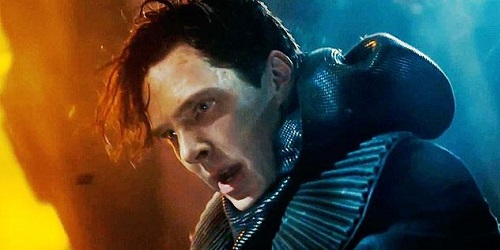
I’m not the first person to compare the two films straight-up, but I may be the first person to suggest that most of the criticisms made in such exercises miss the point slightly. Does it really matter that Khan has been whitewashed in Into Darkness? Yes, but frankly that’s a problem which fits into an overarching conversation about race in film, instead of a specific critique of Star Trek Into Darkness. (Besides, when a magnificent actor like Ricardo Montalban ends up being replaced by a magnificent actor like Cumberbatch, no one really loses.) Is it a deal breaker that by the end of the film, Roberto Orci, Alex Kurtzman, and Damon Lindelof have all but eliminated the threat of death in the Trek universe and rendered starships totally obsolete? Moreso than the whitewashing, yes, but in the end these details are more or less disposable- especially since another director will take the reigns for the next film, and therefore have the freedom to ignore them completely.
And is it problematic that when Into Darkness recreates The Scene from Wrath– the scene where Spock bids a heartfelt goodbye to Kirk, his dearest friend, before sacrificing himself to save the crew and the Enterprise itself- it does so using two characters who have known each other for only a couple of years and hated each other on and off for most of them? Not in the slightest. Yes, Leonard Nimoy and William Shatner invested a great deal of time in fostering the bond between the characters they portrayed on screen; yes, that gave their final moment together in Wrath massive emotional heft; yes, that’s a tough thing to duplicate with actors who haven’t shared the screen for even a fraction as long as their predecessors. But that’s where Abrams’ casting and Quinto’s and Pine’s excellent chemistry comes in, and that special quality lets them make up the gap.
At the same time that beat doesn’t occur in a vacuum, and taken in tandem with both the remainder of Into Darkness and the entirety of Wrath, it doesn’t, and in fact winds up being one of the former’s defining, crippling features. Kirk, put simply, can’t die. Anybody who has ever watched a series like Trek knows this; it’s a basic rule of the formula, one that is rarely broken (with notable exceptions, like the televised version of Game of Thrones). The good guy survives. He lives to fight on another day. Maybe he suffers losses in the process, but he’s still standing once the credits start to roll. Abrams, taking a page out of Joss Whedon’s playbook, tries to upend that tenet, and it’s a bold if somewhat unimaginative move. Kill Kirk instead of Spock? Sure, why not? The question of Kirk’s capabilities as a leader has been raised enough times throughout the rest of the plot that giving him the chance to prove his worth for good and all seems fitting. Maybe it took all of two seconds to twist Wrath‘s signature moment in this fashion, but it’s almost genius-level when the “hero must live” clause of genre-writing is taken into consideration.
That just makes his near-immediate resurrection feel even more like a sloppy, cowardly screenwriting shortcut. When a character must face death in a narrative, that death should never feel cheap. There’s been a reasonable level of outcry over the return of Phil Coulson, killed by Loki in last year’s Avengers, in this fall’s Agents of S.H.I.E.L.D. TV show, and for good reason; his death is a giant motivating factor in the events of that film. Bringing him back, especially with a trick so dirty as the Great Lie (he wasn’t really dead!), is inexcusable. So too is Kirk’s heavily-telegraphed revival. Even if that development can be seen from a mile away, the script nonetheless pours denigration atop his sacrifice and renders it meaningless.
Of course, the characters don’t know that Bones has discovered the elixir of immortality flowing through Khan’s veins; one could successfully argue that the catharsis Spock and Kirk experience is therefore real within the context of the scene. To a point, that’s absolutely true. If it wasn’t, movies wouldn’t be able to lead audiences to their own catharses, and we would have very little reason to watch them**. But there’s a divide between what the characters feel and what the audience feels, and with our knowledge and perspective as outsiders, there’s no genuine catharsis to be found in Kirk’s decision to die; there’s just the illusion of one, because the risk he takes isn’t actually much of a risk. (And also because we know that even Abrams cannot kill James Tiberius Kirk.) Kirk’s death, then, has no dramatic weight, and so his last action and parting exchange with Spock feel hollow. Farewell, until we meet again in twenty minutes.
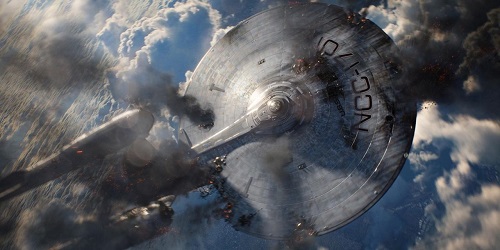
Underneath all of this lies a more troubling matter that ties right back to the recycled nature of the script. What, exactly, is gained by essentially cannibalizing the most prominent characteristics of Wrath of Khan? No one in Into Darkness, save for Spock Prime, the film’s other big screenwriting cheat, knows Khan by name or visage whatsoever- even though he controlled over a quarter of the Earth following the Eugenics Wars of the 90s***- and there’s a good chance a huge chunk of Abrams’ audience doesn’t know, either. Maybe that makes the film’s tendency to reuse Wrath‘s plot details less of an issue; if no one identifies the winking and nudging inherent to Spock crying out his enemy’s name at the top of his lungs, then who cares?
The answer is simple: everyone. Or, at least, everyone should, whether they’re Trek fans or not. Simply put, Abrams, Orci, Kurtzman, and Lindelof took the laziest route possible to constructing the narrative for Into Darkness, and in doing so committed two different offenses to the split demographic that comprises their audience. In adopting Wrath‘s material, the authors suggest that the fans just want to be fed the same stories ad nauseum. They also convey the idea that cribbing from other narratives is a victimless crime when your viewers don’t recognize the source material. Ultimately, they disprove any statements intended to paint Abrams’ Trek films as re-boots; when his films simply lift concepts from past entries in the Trek saga whole sale, then he’s not truly rebooting anything at all. Is he making exciting movies worth seeing in theaters? Sure. But is he making honest movies that fulfill the promise he instills in them? Not at all.
*Statements like this tend to invite trouble, so let me clarify: The Wrath of Khan is absolutely a great Star Trek movie, through and through, and should be recognized in that capacity. But it’s also good enough that it deserves to be lauded alongside other classics of the medium.
**Or to read poems, or novels, or to observe art, or to listen to music, and so on and so forth.
***Per Trek canon. It’s touched on in the movie but nobody acts like they know anything about the conflict Spock Prime refers to.

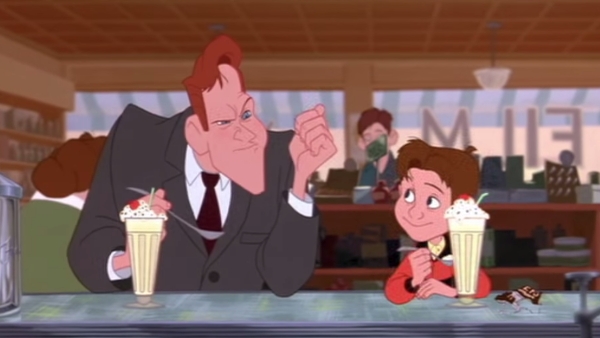

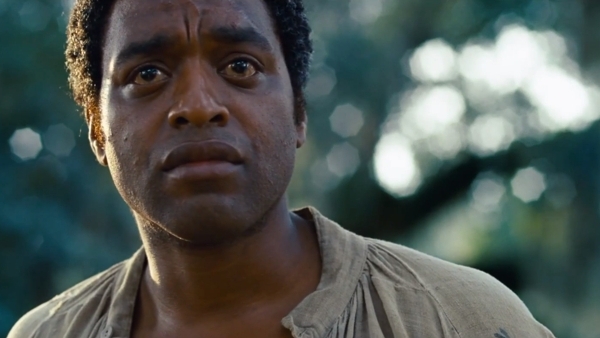
4 Comments
Dan Fogarty
Nice write up Andy. I agree, it WAS lazy. It was also cheap having Kirk die for only a few minutes. 🙄 I disagree though about Quinto and Pine being able to make up for “the gap”. This “moment” felt competely unearned. As I watched it, I wasn’t as upset that they borrowed it from the prior movies, it just didnt feel “earned” to me… it had none of the emotional weight that the WoK moment did. 🙁
I hope this is the last time this reboot series feels the need to borrow from the past… hoepfully they’re not off chasing whales or something in the near future. 🙁
Andrew Crump
Exactly my feeling. Star Trek is such a big, open sandbox that Abrams’ (and Orci’s, and Lindelof’s, and Kurtzman’s) insistence on revisiting well-tread ground over and over again frustrates me. Note that I have a lot of sharp thorns to stick in Orci’s and Kurtzman’s sides- I think they’re talentless hacks who lack anything resembling vision- and I’m also less than fond of Lindelof’s style (though his willingness to self-critique in public is REALLY admirable), so I probably appear biased here, but they could do so much more with the world they’re inhabiting.
The reason that The Scene works for me here- at least until the Khan scream and Kirk’s immediate resurrection- is that it doesn’t totally approach death from the same angle. Wrath is about two longtime friends saying goodbye; Darkness is about two men trying to become friends reconciling before death totally severs whatever bond they have and keeps them from ever developing it. The scenes deal with different kinds of loss, and in that regard, I like it.
But bringing Kirk back just sweeps the legs out from underneath it. It’s lame. Not that I think we live in a world where someone can kill Kirk without invoking the fury of an army of Trek diehards (I imagine R.A. Salvatore, the guy who killed Chewbacca that one time, knows what that’s like), but man, that would have been brilliant.
Dan Fogarty
I’ll tell ya, bringing Kirk back DOES undercut the scene, but I knew right away they wouldn’t have the balls to keep him dead, even for a little while. I also connected the Tribble injection and knew exactly how they were going to resurrect him. 🙁
As to Orci and Kurtzman, your comment made me look into their filmography a little more, and you’re right, there’s a LOT of dreck on there. Doesnt give me much hope for Amazing Spider-Man 2.
Self depricating or not, Lindelof has penned some of the biggest let downs in recent memory. He’s practically the kiss of death. 🙁
Andrew Crump
Lindelof, in fairness, is responsible for some of the best episodes of Lost; he’s gone off the deep end and written recent releases like Prometheus into holes, but I respect him. I don’t have anything nice to say about Orci or Kurtzman. They’re worthless.
And bang on about the Tribble. The moment Bones starts playing God with a dead Tribble, we know exactly where the film is taking us. Like I said, they telegraph that “twist” REALLY heavily.